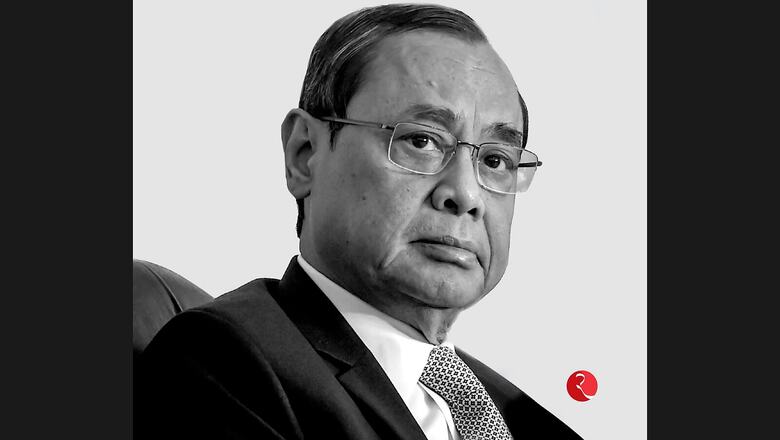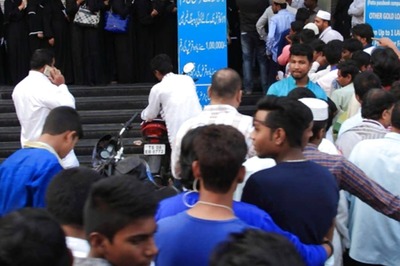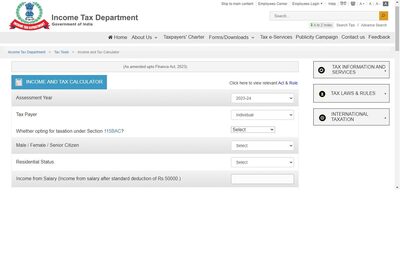
views
The hearing of the Ayodhya case(s) commenced at 10.30 am on 6 August. There were not too many advocates in the Court. Sushil Kumar Jain, senior advocate, appearing on behalf of the Nirmohi Akhara, the appellant in one of the cases i.e. C.A. No. 4905-4908/2011, began the arguments. I did not think he was very well prepared. Perhaps he had not expected the hearing to really commence. The hearing dragged on until fireworks emanated from Dhavan who, during Jain’s arguments, looked at me and said that these cases could not be heard in the manner that I would ‘normally’ hear cases coming before me. This was without any provocation, and only because we had urged Jain to step up the pace of his arguments. Everything will have to be considered and everybody will have to be given a full hearing, Dhavan said. All documents would have to be scrutinized. Dhavan indicated that he may himself take about six weeks to complete his arguments. At one point, he also mentioned that none of the judges except Justice Chandrachud had either read the papers or understood the case. I requested all my brother judges to remain silent and not to respond as it could have resulted in scuttling of the hearing.
Such incidents kept occurring in court frequently and increased with time. But the hearing continued. Many of the questions put to the counsel by the Court were elaborately answered and some of the replies were insightful and knowledgeable, though, at times, unconnected with either the question raised or the issues arising in the case. Equally, at times, the questions by the Court too were academic and unconnected with the case. As the CJI, I had to constantly bring the ship back to course.
About a week after commencement of the hearing, I found a huge change in the atmosphere in court. The courtroom became more crowded; lawyers who may have harboured scepticism about the possibility of any sustained hearing of the case became cooperative. Our decision to have five days’ continuous hearing (Monday to Friday), which had initially met with stiff resistance, became more accepted. Dhavan, who had insisted on a mid-week break at least while he would be arguing, agreed to remain on his legs all five days when I pointed out that he could take a mid-week break on a Wednesday—with the consequence that somebody else would argue a separate appeal or IA on that day. As the hearing progressed and my retirement drew closer, I suggested that we could continue the sessions until 5 pm. All the counsel agreed and for a considerable number of days we heard the matter until 5 o’clock.
Apart from Sushil Kumar Jain, arguments were offered by K. Parasaran, C.S. Vaidyanathan, Ranjit Kumar, P.S. Narasimha (now a judge of the Supreme Court), Jaideep Gupta, Vikas Singh, Hari Shankar Jain, V.N. Sinha and several others whose names I do not recollect. They argued on behalf of the Hindu parties whereas Dhavan, Meenakshi Arora and Zafaryab Jilani principally argued on behalf of the Muslim parties. The judges acknowledged in open court the valuable assistance rendered by the counsel of both sides.
The arguments that commenced on 6 August were heard for 40 days and concluded on 16 October. On the last date of hearing, at about 11.30 am or 12 noon, I received a slip of paper from the Secretary General of the Supreme Court stating that a representative of one of the litigants was seeking permission to enter the Supreme Court. Justice Bobde, who was to my right, and Justice Chandrachud, on my left, asked about the note as receipt of notes from registrars in the midst of hearing by a five-judge Bench is somewhat unusual. Since it pertained to an administrative matter, I told them accordingly. I sent a handwritten reply to the Secretary General saying that under no circumstances was the person to be allowed entry. A bona fide visitor to the Supreme Court in connection with his case is always entitled to a visitor’s pass through his Advocate-on-Record. Since this person was approaching the Registry or the Secretary General for entry, I sensed that his objective was not well-intended but aimed at disrupting the hearing. Had he been able to do that, the court proceedings would have been affected and the case may have had to be adjourned. The Secretary General acted as he was instructed.
During the lunch recess, he sought further instructions. I enquired whether he could maintain status quo for another two hours. He assured me he could. The hearing resumed at 2 o’clock and a little after three, I closed the hearing by saying, ‘Enough is enough’ and ‘Judgment is reserved’. This is how the hearing of one of the longest disputes in legal history and one of the most fiercely contested cases in the Supreme Court came to an end.
I must confess that the conduct of business in court, never for a moment, reflected the ongoing stress, anxiety and trauma within me. The years of training and self-discipline as a judge were pressed into service. But, at every moment, I was conscious that the oral hearings, the discussions amongst the judges, the preparation and delivery of the judgment—all had to be completed within a time frame in view of my impending retirement on 17 November 2019.
I often carried the surcharged emotions home. My wife was the only person with whom I could share the turmoil within me and lay bare the highly disturbed man behind the cool and calm exterior exhibited in the courtroom. One particular day, I refused to go to court. Rupanjali eventually won with her enormous persuasive powers. On another day, though she succeeded in pushing me out of the house (5, Krishna Menon Marg), once I reached the Court, I refused to budge from the chamber. Justice Bobde called off the hearing that day, telling the other judges that I was unwell.
While the hearing was progressing, negative statements by activists and lawyers on one or another unrelated issue kept getting published, perhaps to disturb the peace which was required to decide a case of such magnitude. I do not remember getting more than three to four hours of daily sleep during the entire period of the Ayodhya hearing.
Negative comments on the feasibility of completion of hearing; statements by activists about the misplaced priority of the Supreme Court in taking up the case and wasting judicial time and, to top it all, the Damocles’ sword-like deadlines for completion of the different stages of the case kept reminding me what was at stake—the consequences to me and the institution, and its reputation if the case was to remain inconclusive before my retirement. Even some of my colleagues were highly sceptical. Why has this madman put the reputation of the Supreme Court at stake, was the topic of several private conversations amongst the judges. But the way things progressed and ended convinced me that there was a divine force which made the conclusion of the case, regardless of the way the judgment went, possible.
A somewhat unusual feature of the three-month hearing was that no judge on the Bench availed of casual leave even for a day. No judge on the Bench suffered even from a common cold or fever that kept him away from the hearing. Equally inexplicable was another occurrence. One of the judges told me that he might have to take leave for a few days as a close relative was seriously ill and in the ICU of a hospital. I told him that he might not require to do so as his relative would recover. This was in order to console and comfort him. The judge did not take any leave, and I too did not ask about his relative as presumably he had recovered.
While I must acknowledge and appreciate the role of all my brother judges on the Bench, Justice Bobde’s part in bringing the Ayodhya case to a logical conclusion, in spite of the multiple hurdles, is significant. Without his contribution, the Bench could not have succeeded in completing the case within the available time frame.
Every day, after the hearing, all five judges would meet in the Chief Justice’s chamber for a cup of tea. We used to talk about many other things and only generally about the case and the arguments made in the course of the day. Never did we discuss which way the verdict should eventually go.
It was only in the last few days of the hearing that there appeared to be unanimity of opinion building up that the disputed land should go in favour of the Hindu parties for constructing the Ram temple and the Muslim parties should be allowed a five-acre alternative plot in a suitable and prominent place in Ayodhya for building a mosque. It was agreed that relief would be moulded accordingly.
This excerpt from Justice for the Judge: An Autobiography by Ranjan Gogoi has been published with the permission of Rupa Publications
Read all the Latest Opinions here

















Comments
0 comment